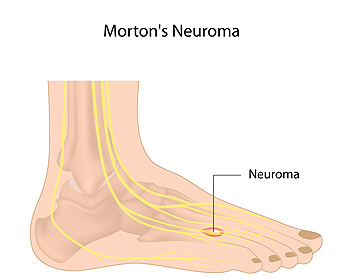How to Find Relief With Morton’s Neuroma
Tuesday, 22 November 2022 00:00
One of the most common symptoms that patients notice with the foot condition that is referred to as Morton’s neuroma is the sensation of having a pebble in the shoe. It can cause continuous pain in the ball of the foot, and it most often happens as a result of frequently wearing high heels. These types of shoes generally do not provide ample room for the toes to move freely in, possibly causing the nerve between the third and fourth toes to become irritated. Additional symptoms can include having a numbing or tingling feeling in the toes, and a burning pain may exist in the ball of the foot. Patients have found relief in the beginning stages of Morton’s neuroma when shoes with lower heels are worn, and participating in sporting activities is temporarily ceased. In severe cases, surgery may be necessary, which can permanently repair or remove the affected nerve. If you feel you may have this condition, please speak with a podiatrist who can help you to decide on the correct treatment method.
Morton’s neuroma is a very uncomfortable condition to live with. If you think you have Morton’s neuroma, contact Dr. Steven Schwartz of Pennsylvania. Our doctor will attend to all of your foot care needs and answer any of your related questions.
Morton’s Neuroma
Morton's neuroma is a painful foot condition that commonly affects the areas between the second and third or third and fourth toe, although other areas of the foot are also susceptible. Morton’s neuroma is caused by an inflamed nerve in the foot that is being squeezed and aggravated by surrounding bones.
What Increases the Chances of Having Morton’s Neuroma?
- Ill-fitting high heels or shoes that add pressure to the toe or foot
- Jogging, running or any sport that involves constant impact to the foot
- Flat feet, bunions, and any other foot deformities
Morton’s neuroma is a very treatable condition. Orthotics and shoe inserts can often be used to alleviate the pain on the forefront of the feet. In more severe cases, corticosteroids can also be prescribed. In order to figure out the best treatment for your neuroma, it’s recommended to seek the care of a podiatrist who can diagnose your condition and provide different treatment options.
If you have any questions, please feel free to contact our offices located in Chambersburg, and Mcconnellsburg, PA . We offer the newest diagnostic and treatment technologies for all your foot care needs.

